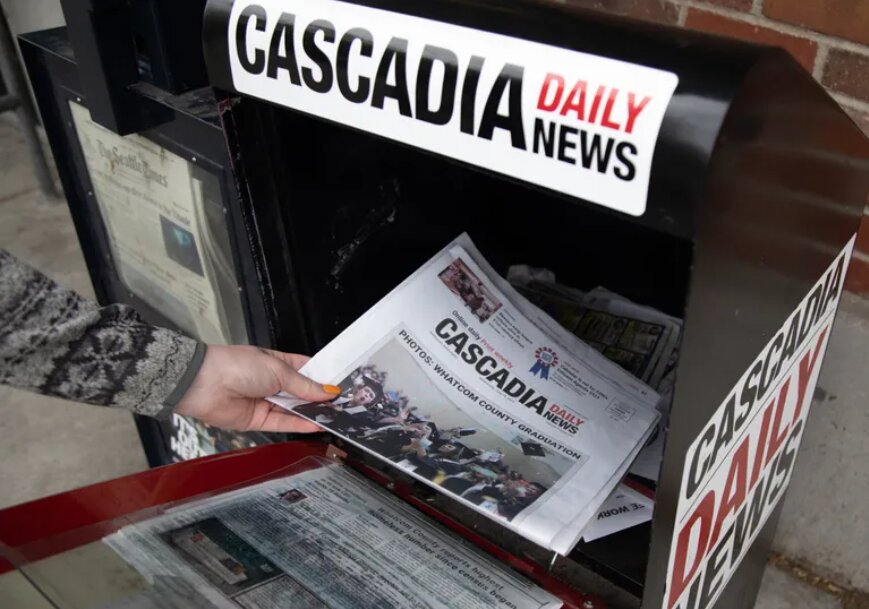
Two years into its bold experiment in local news, Bellingham’s Cascadia Daily News is giving itself a makeover.
The for-profit newspaper launched online in January 2022 and began printing weekly editions that March.
Now, after building a loyal audience with its ambitious and feisty journalism, it’s overhauling infrastructure, changing its cadence and increasing its focus on becoming profitable.

“We’re doing a reboot now,” said Ron Judd, Cascadia’s founding executive editor.
Cascadia is a rarity among the recent wave of news startups seeking to replenish news deserts and fill voids created by failing papers and corporate-owned newspapers slashing newsrooms.
Most new news ventures nowadays are online-only nonprofits that depend on the largesse of donors.
If successful, Cascadia could offer a different model for communities that want to restore general-interest news coverage in print and online.
First, though, Cascadia needs to actually become profitable, before the patience of its generous benefactor runs out.
Among those hoping it succeeds is Whatcom County Executive Satpal Sidhu, who said Cascadia’s work has increased civic engagement and turnout at city and county meetings.
“This has been a godsend in our community, which deteriorated over the last decade to basically no local reporting or very little local reporting,” he said.
Sidhu said the upstart is also spurring on the thinned-out Bellingham Herald, a daily that’s now part of a chain owned by a New Jersey investment firm.
“It has given the Herald a run for the money in the sense that the Herald is also getting better, which is great,” Sidhu said.
With its makeover, Cascadia is also starting to compete more with the Herald’s business side.
That includes shifting its publication, starting in the coming week, from Wednesdays to Fridays.
This follows the Herald’s switch on June 26 to postal delivery. Because mail doesn’t come on Sunday, the Herald is converting its flagship Sunday edition to a weekend package arriving on Saturdays.
By printing on Friday, Cascadia aims to have its paper also arrive on Saturdays. Simultaneously, Judd is making it a more weekend-like product, showcasing top stories and photography.
Judd sees the Herald’s switch to postal delivery as an opportunity for Cascadia to win subscribers.
“I would suspect that a lot of those remaining Herald print customers are in play because they’re not going to like that,” he said.
Judd said the Herald’s few local reporters “do some good work but it’s not enough” and the daily’s apparent strategy of luring readers with “click-baity” content “doesn’t seem to make sense on a local level.”
Cascadia is bankrolled by David Syre, a newspaper lover who made a fortune in lumber and real estate development and is now a professional artist. He has invested more than $2 million so far in the paper.
Judd said Syre’s a dream owner, completely hands off, and there’s no deadline for when the paper must be profitable.
But there’s subtle pressure from Syre’s business representative, and less subtle pressure internally for the team to get the business side on track, now that Cascadia has established its journalistic reputation.
“He’s not Jeff Bezos, right?” Judd said. “It’s been very clear to me from the beginning there’s a finite amount of money. A lot of this pressure is from us; he’s ended up fronting way more money than he ever anticipated.”
Syre did not respond to a request for comment before deadline. He told me in 2021 that “if you can sustain local news — that means reporting — I am very optimistic that the subscriptions and advertising will follow.”
That viewpoint is refreshing in a newspaper industry that’s come to be dominated by chains controlled by or indebted to financiers, who are less patient and have shown more interest in cutting than growing newsrooms.
Cascadia employs 12 in its newsroom, putting it on par with some of Washington state’s chain-owned dailies.
Recent hires include a new managing editor, Rhonda Prast, who previously led the investigations team at the Las Vegas Review-Journal, and General Manager Staci Baird, who moves from managing editor to the business office.
A new publishing system and a new website are in the works.
Free distribution will end this summer as the paper moves past its introductory launch period. It will offer more subscription options, including pricing tiers with lower costs for digital-only subscribers and student discounts. Cascadia now has around 3,000 subscribers and has been giving out 8,500 copies per week.
This will also change the dynamic of Cascadia’s competition with the Salish Current, a Bellingham-based nonprofit news site that doesn’t charge for access.
Sidhu said Cascadia’s price, if reasonable, “is worth it because the value they bring to the community is great.”
That echoes sentiment Cascadia found in a recent market survey, with 80% to 90% of respondents saying they trust the product and want it to continue, Judd said.
All that’s left is to make it profitable and prove the model works when there’s good journalism and healthy competition.
“It’s kind of just an understanding that we all have that we’ve been given a gift here,” Judd said, “and we need to make the most of it and make it profitable or sustainable, as soon as possible.”
Brier Dudley on Twitter: @BrierDudley is editor of The Seattle Times Save the Free Press Initiative. Its weekly newsletter: https://st.news/FreePressNewsletter. Reach him at bdudley@seattletimes.com.